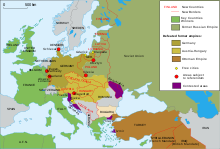1917 Franco-Russian agreement
The 1917 Franco-Russian agreement was a secret treaty between the French Third Republic and the Russian Empire to support one another's territorial claims in settlement following the First World War. Under the agreement France recognised Russia's claim to any portions of Poland that she could occupy, while Russia supported France's claim for the return of Alsace-Lorraine from Germany and right to occupy other parts of Germany in the post-war period.
Formal acceptance letters between the two parties were exchanged on 10 March but the treaty had little effect as the Russian government fell days later during the February Revolution. The French government of Aristide Briand fell on 20 March and representatives of the replacement Alexandre Ribot administration agreed with the new Russian Provisional Government that the treaty had been a mistake.
Background
[edit]
With defeat in the 1870-71 Franco-Prussian War France had lost the territory of Alsace–Lorraine to Germany. A revanchist movement to recover the territory played a key role in French politics thereafter and a desire for military strength led France to enter into an alliance with the Russian Empire in the 1890s. This stood in opposition to the Triple Alliance of Germany, Austria-Hungary and Italy.[1] Russia had little interest in who controlled Alsace-Lorraine but wanted support for her ambitions in Eastern Europe and the Balkans.[2]
Russia's western frontier had been formed during the late 18th and early 19th centuries with the partitioning of Poland between Russia, Germany and Austria-Hungary. The First World War broke out in Summer 1914; a Russian invasion of East Prussia was halted and Russian forces were afterwards gradually pushed back further into their own territory.[3] The Russian Brusilov Offensive of Summer 1916 won back territory in Galicia and destabilised Austria-Hungary at a heavy cost in casualties. Romania joined the war on the Russian side in August 1916; it's defeat by German and Austro-Hungarian troops was a setback but by early 1917 the advantages lay with the Russia and her allies who planned simultaneous attack on all fronts.[4] The Western Front where France and Britain fought Germany had remained largely static after initial German advances in Belgium and north-eastern France. French attempts to seize Alsace-Lorraine at the start of the war had been unsuccessful.[5]
Treaty negotiations
[edit]
Discussions between France and Russia on a post-war revision of frontiers began as early as 1915.[6] On 9 March 1916 the Russian foreign minister Sergey Sazonov had written to the Russian ambassador in Paris Alexander Izvolsky, ahead of an upcoming allied conference, to state that his government was prepared to grant France and Britain free reign in determining the new western frontiers of Germany if Russia was granted the same freedom for the eastern frontiers of Germany and Austria-Hungary and that there was no question of the creation of a Polish state.[6]
High level discussions proceeded on 3 February 1917 when the French Minister of the Colonies Gaston Doumergue met with the Russian Tsar Nicholas II. Nicholas told Doumergue that he was worried about interference in the settlement of post-war borders in Europe from US President Woodrow Wilson who he accused of carrying out "phony humanitarianism". Nicholas argued that France needed to take steps to ensure she was supported in discussions over the border. Doumergue reported this back to the French government and Philippe Berthelot was tasked to draft an agreement in general terms that both nations would support each other militarily, industrially and economically, without detail of the border agreement.[7] The Russian foreign minister Nikolai Pokrovsky reported details of the meeting to Izvolsky and Sazanov (who was then ambassador to Britain) on 12 February.[6] He stated that Doumergue had asked Nicholas for support on French claims to Alsace-Lorraine, for the special treatment of the Saarland (which was to effectively become part of France) and for the separation of all territory on the west bank of the Rhine from Germany to form a new, neutral political entity.[8][6] Pokrovsky noted that Nicholas had agreed to this in principle and that it provided a basis to secure from France support for Russia's claim of the right to define the borders of Eastern Europe and to annul the parts of the Treaty of Paris (1856) that restricted Russian military presence on Åland.[6]
On 14 February Pokrovsky wrote to the French ambassador in Petrograd, Maurice Paléologue, to reiterate his support for French proposals, adding that he would support French military occupation of the western Rhine territory after the war.[9] Paléologue and Doumergue thought they had the authority to proceed and drafted a treaty outlining the French border proposals. News of this shocked the French government who feared the reaction of their British allies if the treaty was leaked to them. Izvolsky called at the French foreign ministry on 16 February to seek a reciprocal agreement on Russia's ambitions for Eastern Europe. The French initially considered that the 1915 Constantinople Agreement was sufficient quid pro quo but Russia insisted, relying on Berthelot's draft document that promised co-operation between the nations.[7] France eventually agreed and a secret treaty was produced stating that in post-war settlements Russia would recognise France's claim to Alsace-Lorraine while France would support Russia's claim to whatever portions of Poland could be conquered.[10][11] Formal acceptance letters were exchanged on 10 March and the following day Izolvsky wrote to Pokrovsky stating that France had recognised Russia's complete independence in establishing her future Western frontier.[7][9]
Aftermath
[edit]
The agreement did not survive the February Revolution in Russia (8-16 March 1917) and became one of the last acts of Nicholas' government. After the 15 March abdication of Nicholas II the Russian Provisional Government, on 29 March, declared its support for the creation of an independent Polish state in all areas where Poles comprised the majority of the population.[10] The French government of Aristide Briand fell on 20 March and details of the treaty remained generally unknown until a parliamentary inquest unearthed them some months later. At this point the Provisional Government's foreign minister, Pavel Milyukov described the agreement as a mistake and new French prime minister Alexandre Ribot indicated his agreement with this.[12] By June the French demands for the post-war settlement extended only to the return of Alsace-Lorraine and the payment of reparations by the Central Powers.[12]
The entry of the United States into the war in April 1917 and the ongoing political and military collapse of Russia saw the Western Allies come round to the idea of an independent Poland as a means of embarrassing Germany. On 26 April the British chancellor of the exchequer, Bonar Law publicly stated the government's support on the matter. In June French government formally recognised the Blue Army as the Polish national army.[13]
The British government regarded the proposed neutral Rhineland state as a mistake that would cause instability in Western Europe. Their policy was to instead rely on the threat of American power as a counter to future German militarism.[12] The British foreign secretary Arthur Balfour on 19 December 1917 declared that his government had never supported the French ambitions for an independent Rhineland.[9]
Towards the end of the war, with an Allied victory in sight, on 3 November 1918 the independent Second Polish Republic was proclaimed. The post-war settlement between the Allies and Germany, the 1919 Treaty of Versailles, defined the Polish western border with Germany. The eastern border was proposed by the newly-founded League of Nations to lie on the Curzon Line. Polish ambitions for further territory led to the Polish–Soviet War and the Treaty of Riga with the Soviet Union secured more land to the east.[14]
The Allied forces occupied the Rhineland after the war, lasting until 1930, and it remained demilitarised until reoccupied by German troops in 1936.[15] The Treaty of Versailles also placed Saarland under a League of Nations mandate as the Territory of the Saar Basin from 1920, policed by Allied and neutral troops. It was reintegrated into Germany in 1935.[16] In response to failures to pay reparations due under the Treaty of Versailles French and Belgian troops occupied the Ruhr region between 1923 and 1925.[17]
References
[edit]- ^ Naval Coalition Warfare: From the Napoleonic War to Operation Iraqi Freedom. Routledge. ISBN 978-1-135-98534-9.
- ^ Snyder, Glenn H. (2007). Alliance Politics. Cornell University Press. p. 187. ISBN 978-0-8014-8428-5.
- ^ Small Nations and Colonial Peripheries in World War I. BRILL. 2 February 2016. p. 168. ISBN 978-90-04-31001-8.
- ^ "Eastern Front". Britannica. Retrieved 26 July 2024.
- ^ "Western Front". Britannica. 18 June 2024. Retrieved 26 July 2024.
- ^ a b c d e Congress, United States (1924). Congressional Record: Proceedings and Debates of the ... Congress. U.S. Government Printing Office. p. 362.
- ^ a b c McDougall, Walter A. (8 March 2015). France's Rhineland Policy, 1914-1924: The Last Bid for a Balance of Power in Europe. Princeton University Press. p. 22. ISBN 978-1-4008-7021-9.
- ^ Torkunov, Anatoly V.; Martyn, Boris F.; Wohlforth, William C. (8 January 2020). History of International Relations and Russian Foreign Policy in the 20th Century (Volume I). Cambridge Scholars Publishing. p. 65. ISBN 978-1-5275-4502-1.
- ^ a b c Congress, United States (1924). Congressional Record: Proceedings and Debates of the ... Congress. U.S. Government Printing Office. p. 363.
- ^ a b Reddaway, W. F.; Penson, J. H.; Halecki, O.; Dyboski, R. (15 September 2016). The Cambridge History of Poland. Cambridge University Press. p. 485. ISBN 978-1-316-62003-8.
- ^ The Polish Review and East European Affairs. Polish Review, Incorporated. 1945. p. 3.
- ^ a b c McDougall, Walter A. (8 March 2015). France's Rhineland Policy, 1914-1924: The Last Bid for a Balance of Power in Europe. Princeton University Press. p. 23. ISBN 978-1-4008-7021-9.
- ^ Davies, Norman (24 February 2005). God's Playground A History of Poland: Volume II: 1795 to the Present. OUP Oxford. p. 286. ISBN 978-0-19-925340-1.
- ^ "Poland - Countries". Office of the Historian. US Department of State. Retrieved 8 August 2024.
- ^ Yeuell, Donovan P. "The German Occupation Of The Rhineland". US Naval Institute. Retrieved 8 August 2024.
- ^ "Under the Auspices of the League, Saar Plebiscite". Library of Congress, Washington, D.C. 20540 USA. Retrieved 8 August 2024.
- ^ "Ruhr occupation | Ruhr Uprising, French Invasion, Weimar Republic". Britannica. Retrieved 8 August 2024.
